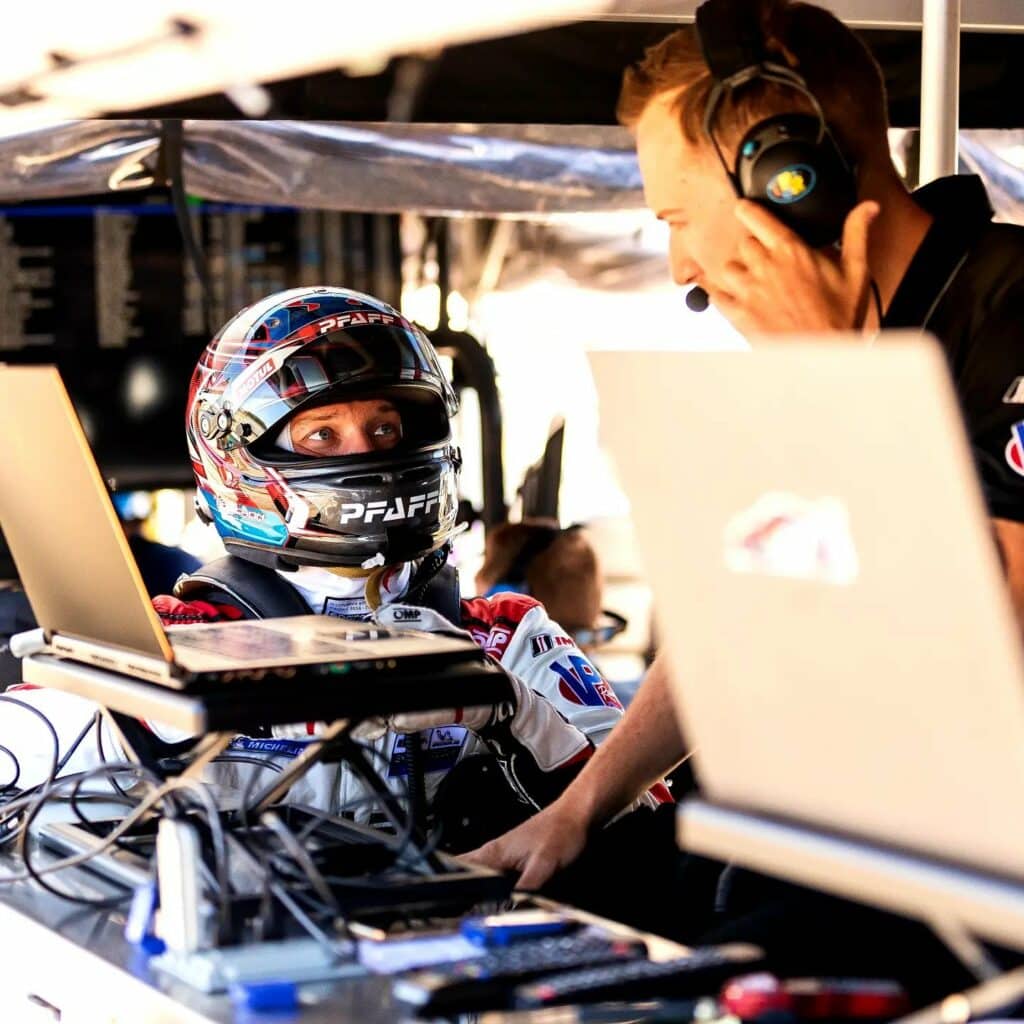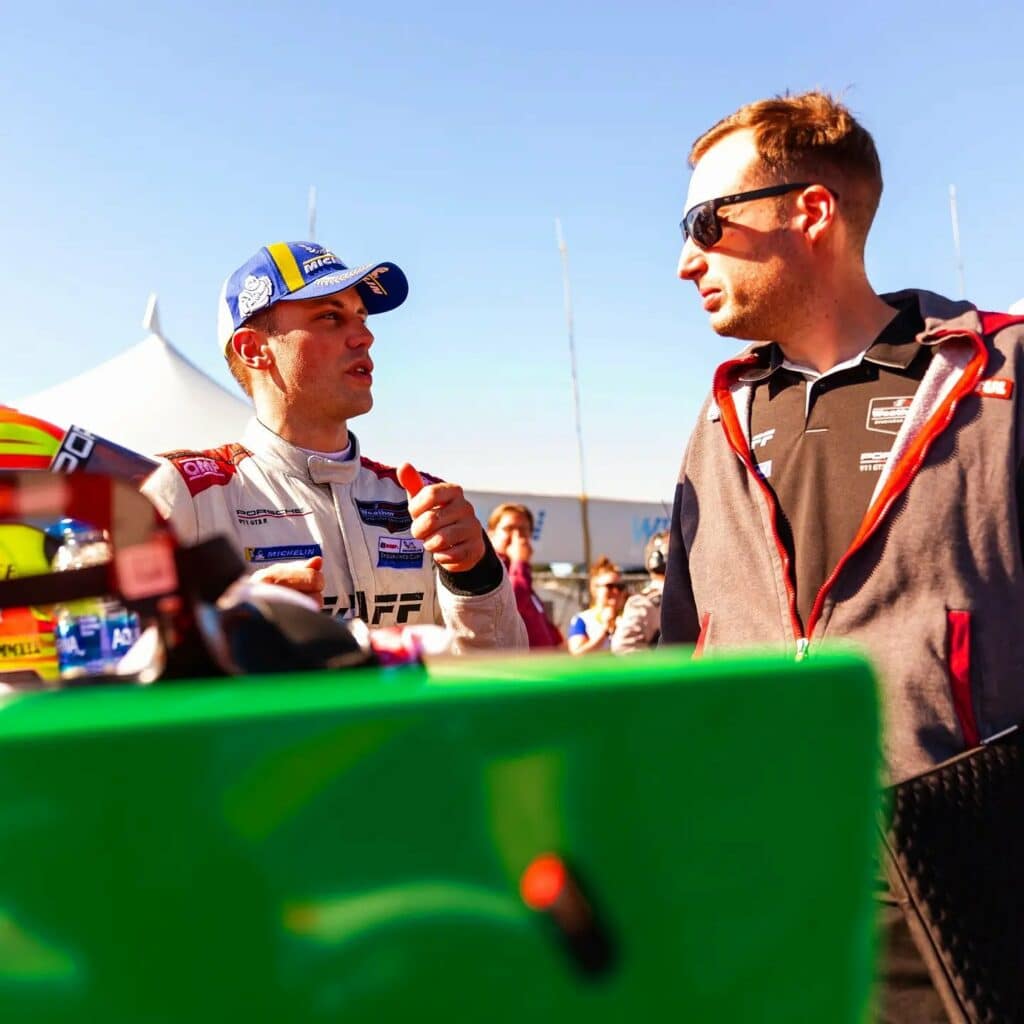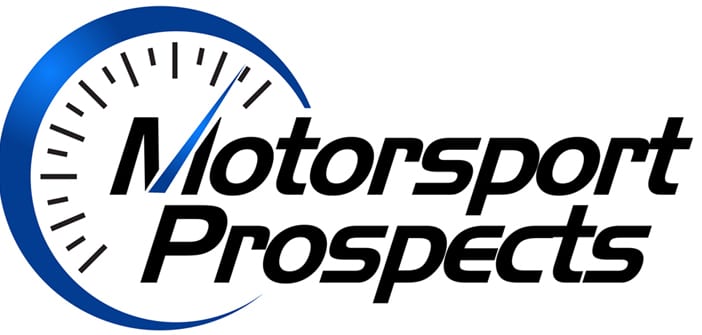
(Editor’s note: Andrew Marangoni, Technical Director & Lead Motorsport Engineer at Pfaff Motorsports was gracious enough to take some time from his busy schedule to discuss the importance of the driver and engineer relationship.)
The relationship between driver and engineer extends far beyond tire pressures and lap charts; at least, it should. The ‘work’ (technical faculties such as vehicle setup) constitutes only a small percentage of the engineer’s role, with everything from psychologist to translator to mediator filling the remainder of the spectrum. In many cases, there is more left in the person sitting in the seat than there is in the car, and it is up to the engineer to extract as much potential as possible, while facilitating a symbiotic relationship between the driver and their mechanical cocoon. After all, if the driver is not comfortable with their tools, they will never be capable of “leaving it all on track”.
As teams begin to grow, these faculties and existential considerations are ultimately spread across different team members/departments, resulting in a ‘broken telephone’ of sorts, and a loss of information. Very few are capable of accurately representing a driver’s thoughts/feelings/impression in a numerical/data driven report. In reality, most don’t even try, as they view the driver as a robot or automaton who’s irrelevant to the equation or decision making! Although the data and subsequent analysis can both corroborate or disprove the feedback of the driver, there are many intangibles or bigger picture considerations that it simply cannot (or that are often missed). Right or wrong, and regardless of the way forward, brainstorming, and constructive discussion is imperative; a philosophy I personally believe in regardless of the industry. For these reasons, you can infer why a close-knit driver/engineer relationship is imperative, and why decision-making should (once all deliberation is assessed) be reserved for said engineer and not diluted by committee; especially when one considers that the engineer is often privy to information that the greater team is not.
Anybody can iterate vehicle settings to infinity and eventually converge on a satisfactory solution. Unfortunately, reality bestows us with a handful of constraints… Track time, costs, tire wear and conditions, existential pressures from sponsors and stakeholders, etc., inhibit us from simply experimenting and iterating forever. At some point, you just have to get it done, and the more efficient you are at converging upon the most suitable solution available on that day, the better. As Carroll Smith said, “He who understands can make his car work better than he who does not. That is why there are lots of people out there who prefer tinkering to winning – it gives them a good excuse!”.

Regardless of if you’re a seasoned professional or a gentleman, the number one priority is to ensure you speak the same language as your engineer – and vice-versa. It’s also imperative that you know how to give valuable information, in addition to the engineer knowing how to ask the right questions. “The car is understeering like a snow-plow” is playfully descriptive, but meaningless. Where is the car understeering? Through the whole corner? Exit only? How much? Is it within the adjustment range of the anti-roll bars or is a spring change required? How MUCH of a change is required? What countereffects may the change impart? Or maybe this is all completely inconsequential because it’s a high-speed corner and the root cause is related to the aerodynamic elements?
The reality is much of this comes down to time and experience; both in the sport at large but also with a specific vehicle/platform. As far as I’m concerned, for an engineer to succeed in motorsport, their mechanical aptitude needs to be exceptional (both practically and theoretically). Although not a necessity for a driver, a similar aptitude (on a working level) can be a significant advantage. By understanding what certain components do and how they work, a driver can better articulate what they are feeling and what they think the root cause may be. If nothing else, it facilitates communication. With experience and seat time, the driver may also become capable of describing how much of a change may be required to achieve the result they perceive they need. By no means is their word absolute – theories must always be corroborated with data – but with experience, these impressions will become more accurate, facilitating the aforementioned pursuit of efficiency and “getting it done”.
Ultimately, there is no secret formula to follow. The ability needs to be there, in conjunction with intangibles such as dedication and desire to win – and that goes for everybody on the team, regardless of their role. Typically, if everybody is giving their all to the cause, it is easily recognized by even the most causal onlooker and serves as an organic ‘springboard’ for a strong relationship to flourish. An engineer may be very good and excel at all of the core technical faculties, but if the driver is unable to build a friendship/off-track relationship with them, their collective ability on-track will eventually plateau. Those intangibles, that final ‘gear’, will never be reached – and that goes both ways for any member of the team.

By no means am I suggesting that personal/social time is the priority, nor should it ever become irresponsible or impact the product on track. But, in simple terms, if you have no desire to build a friendship with your confidant and teammate, you likely already have your answer. Conversely, if you’re able to build that relationship and positively “get in each other’s heads”, so to speak, you will certainly begin to observe a proportional improvement in your on-track performance that will pay dividends for years to come.
If nothing else, you’ll have gained a friend.
